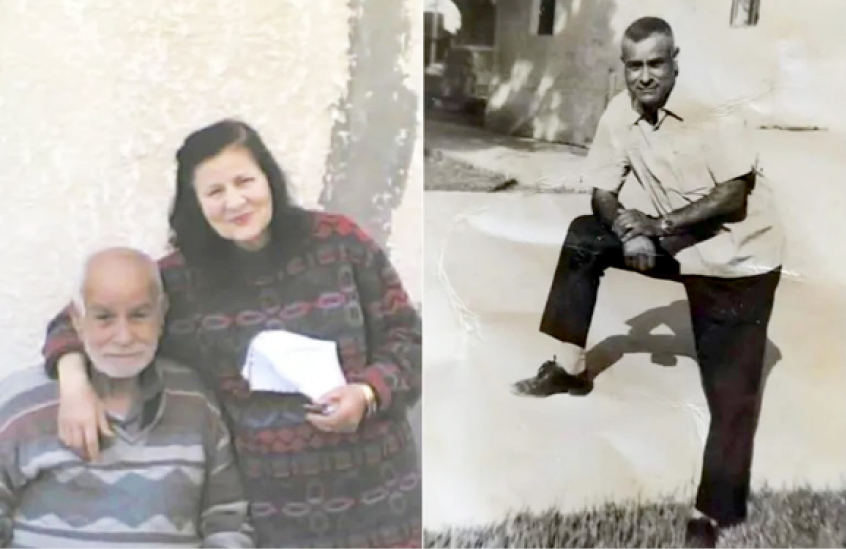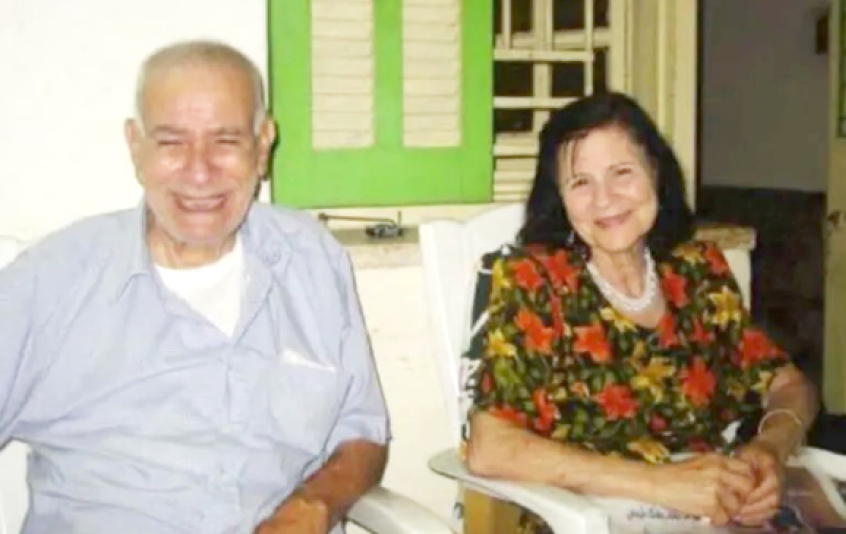A romance, a birthplace: Destroyed memories of Gaza’s bombed Ahli Hospital
The wing of a medical facility is not where most love stories begin. But that’s why al-Ahli Arab Hospital in Gaza – the oldest one in the besieged enclave – was more than just a hospital, says Hammam Farah. The facility, with a name that means “The People’s Arab Hospital” in Arabic, is where Farah’s […]

Hammam’s grandparents, left, had a loving marriage which started when his grandfather, Elias, right, was working at al-Ahli Hospital
[Courtesy of Hammam Farah]
The wing of a medical facility is not where most love stories begin.
But that’s why al-Ahli Arab Hospital in Gaza – the oldest one in the besieged enclave – was more than just a hospital, says Hammam Farah.
The facility, with a name that means “The People’s Arab Hospital” in Arabic, is where Farah’s lineage came together.
His grandfather, Elias Farah, began working at the hospital when he was just 17.
He started as a server in the cafeteria during the British Mandate of Palestine more than 80 years ago and later became a procurement manager, responsible for buying food, medication and supplies.
One day, he spotted the woman who would soon become Farah’s grandmother, known to many as Lady Sura.
Lady Sura was a principal at the nearby Beach B Elementary school in the UNWRA-run Al Shati refugee camp and visited the hospital often.
There, their courtship began.

Ping-pong, dinners and games
Now the hospital stands decimated, the site of carnage following a bombing that killed at least 500 people Tuesday night, its memories and stories perishing.
“The hospital was a community,” Farah told Al Jazeera.
Some 40 years after his grandparents met in its corridors, in 1983, Farah himself was born in that hospital. And so was his sister.
While he has not been able to visit Gaza in 23 years, the psychotherapist now based in Toronto, Canada, cherishes childhood memories from there.
His grandfather often took him to the hospital during his shifts.
“There were children playing about, a ping-pong table, it was a community centre, dinners were held there,” Farah listed nostalgically.
The hospital, founded in 1882 and run by the Anglican Episcopal Diocese of Jerusalem, also had a church, a tennis court – where Farah’s grandfather often played – and a large courtyard.
Now, massacred bodies lay in heaps, the hospital damaged.
‘They can smell the burning bodies’
Upon hearing news of the blast, which Israel has blamed on a failed rocket launch by the Palestinian Islamic Jihad group, Farah panicked.
He still has family back in Gaza, relatives who have been sheltering in a church in the vicinity of the hospital.
Farah “freaked out”, he said, as he desperately tried to get in touch with them, only calming down when he learned they had not been harmed by the blast.
Still, being so close to the destruction, they have witnessed the carnage, he said.
“They can smell the burning bodies,” Farah said.
His family in the Gaza Strip – aunts, uncles, cousins and other distant relatives – have been surviving on canned tuna and dried pasta, as food and other supplies are fast running out, with Israeli forces preventing humanitarian aid from coming in.
A day earlier, Farah’s mother spoke to one of his aunts there.
“She’s not normal,” his mom told him.
All of his relatives’ homes were destroyed in the near-two weeks of Israeli bombardment. Now he and his mother are contemplating how they may relocate their family once – and if – they are able to leave Gaza.
Since Israel retaliated for Hamas’s attack 13 days ago, the mental health professional has been unable to do much else besides work.
“My eyes are glued to my phone or TV,” he said, adding that his entire schedule is put on hold as he awaits news from his relatives every day.
‘They passed away, one by one’
Farah last visited Gaza in the year 2000, not knowing it would be his last visit. His family lived in the United Arab Emirates for many years and would make trips there every summer.
He was always bewildered by his relatives’ reactions when he and his family would leave at the end of the summer.
“There would be traumatic wailing and crying, as if it would be the last time we saw each other,” Farah said.
In 2000, he was just 17 and thought he would return the following summer like he always did.
But that chance never came.
The blockade Israel imposed on Gaza in 2007 has made it challenging to go back.
Each year since, Farah hoped to visit, especially to see his grandparents, but still that chance never came.
“They started to pass away, one by one,” he said.
Now, his memories of them are forever imprinted in his brain. His grandmother Sura, in particular, continues to profoundly impact Farah’s Palestinian identity.
And impactful she was: The school for refugee children she worked at was known as “The School of Lady Sura”, he said.
“While others took up arms to resist the Israeli occupation of Gaza after 1967, Lady Sura picked up her principal’s yardstick and taught a generation of refugees their basic self-respect,” Farah wrote in an Instagram post shortly after her passing in 2019.
In a posthumous address to his grandmother, he wrote: “It will be easier to see you in the afterlife than it has been in Gaza.”
SOURCE: AL JAZEERA.COM
